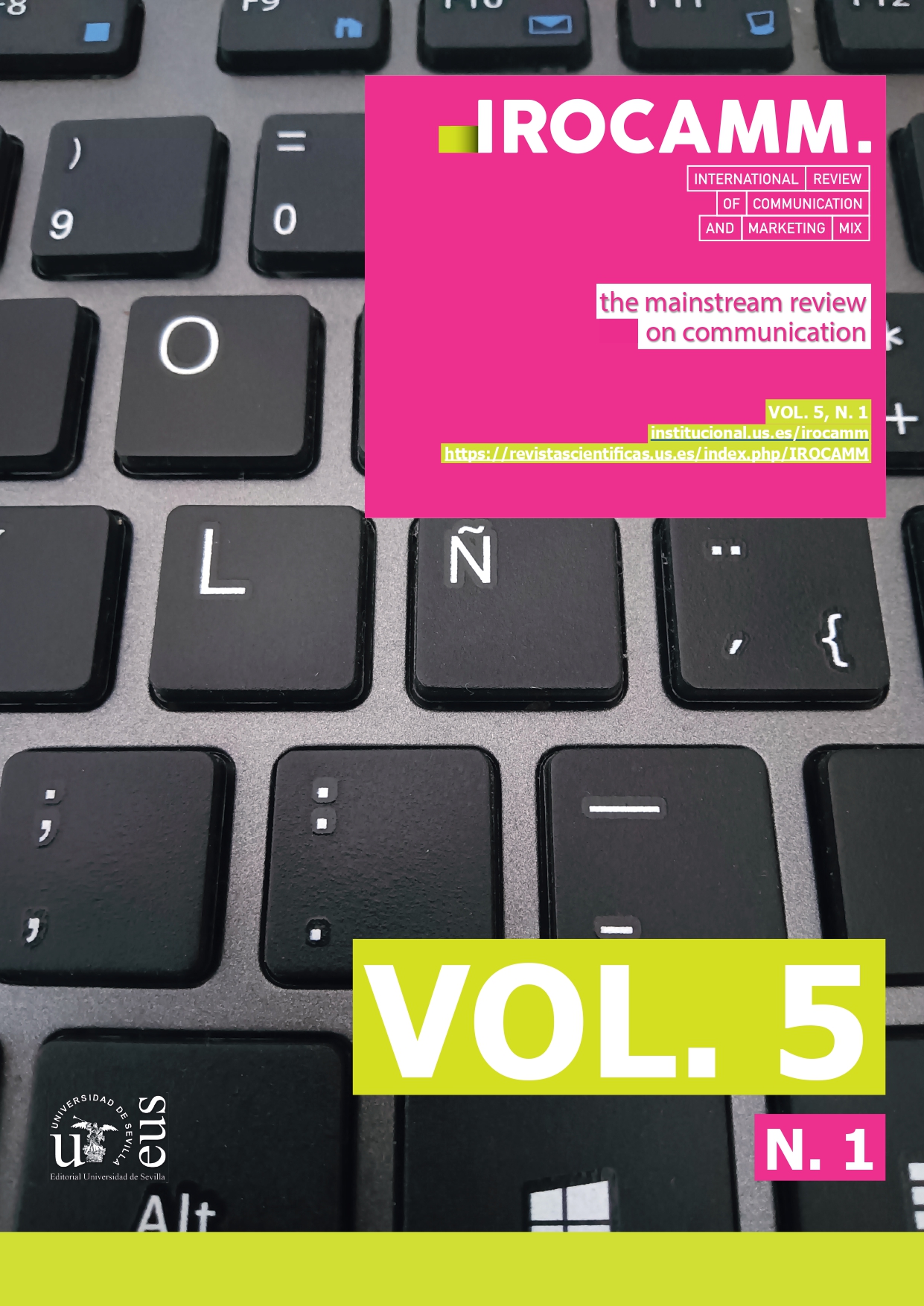La comunicación de la diversidad sexual en los medios sociales:
TikTok y la Comunidad Trans
Palavras-chave:
TikTok, transgénero, disforia, LGTBIQ , redes socialesResumo
Este trabajo analiza la comunicación de la diversidad sexual en las redes sociales, a partir del análisis de
diez cuentas de usuarios influyentes de habla hispana, miembros de la comunidad trans, en la plataforma
TikTok. Esta red, además de mostrar vídeos de humor y de baile, se ha convertido en una herramienta
de comunicación para todo tipo de colectivos, incluyendo la comunidad LGTBI+ y la comunidad trans.
Los vídeos colgados por los usuarios, en los que hablan de temas relacionados con el proceso de
transición se ofrecen no solo a las personas interesadas en el tema, sino a todo tipo de público, lo
que provoca un efecto de normalización y visibilidad que no se encuentra en otras plataformas, donde
estos contenidos sólo son consumidos principalmente por otras personas trans o interesadas en el tema.
Downloads
Referências
Anderson, K. E. (2020). Getting acquainted with social networks and apps: it is time to talk about TikTok. Library Hi Tech
News. https://doi.org/10.1108/LHTN-01-2020-0001
Ballesteros, C. (2018). El índice de engagement en redes sociales , una medición emergente en la Comunicación académica
y organizacional. Razón y Palabra, 22(January), 96–124.
Berners-Lee, T. (2020). Why the web needs to work for women and girls. https://bit.ly/3v0cvja
Casero-Ripollés, A. (2016). Estrategias y prácticas comunicativas del activismo político en las redes sociales en España.
Historia y Comunicación Social, 20(2). https://doi.org/10.5209/rev_hics.2015.v20.n2.51399
Chapple, C. (2019). TikTok Clocks 1.5 Billion Downloads on The App Store and Google Play. Sensor Tower. https://bit.
ly/3uYYQZT
Dawley, S. (2020). Social Trends 2020. Social Media Marketing & Management Dashboard - Hootsuite. https://bit.ly/3FAxyxL
Fraser, N. (1990). Rethinking the Public Sphere: A Contribution to the Critique of Actually Existing Democracy’. Social Text,
/26, 56–80.
Haimson, O. L.; Brubaker, J. R.; Dombrowski, L.; Hayes, G. R. (2015). Disclosure, Stress, and Support During Gender
Transition on Facebook. CSCW ‘15: Proceedings of the 18th ACM Conference on Computer Supported Cooperative
Work & Social Computing, 1176–1190. https://doi.org/10.1145/2675133.2675152
Haunt, C.; Snake, D.; Copies, S. V.; Gateway, U.; Computer, B.; Powershell, T.; Webex, C.; Xe, I. O. S.; Webex, C.; Mesh,
V. (2020). TikTok dangers. Network Security, 2020(1), 3–19. https://doi.org/10.1016/s1353-4858(20)30004-0
Horak, L. (2014). Trans on YouTube: Intimacy, Visibility, Temporality. TSQ: Transgender Studies Quarterly, 1(4), 572–585.
https://doi.org/10.1215/23289252-2815255
Jenzen, O. (2017). Trans youth and social media: moving between counterpublics and the wider web. Gender, Place and
Culture, 24(11), 1626–1641. https://doi.org/10.1080/0966369X.2017.1396204
Kemp, S. (2019). Digital 2019: Q4 Global Digital Statshot — DataReportal. Global Digital Insights. https://bit.ly/3iQyq7s
Kemp, S. (2020). Digital 2020: Global Digital Overview — DataReportal. Global Digital Insights. https://bit.ly/3mGHAEL
Krueger, E. A.; Young, S. D.; Krueger, E. A. (2015). Twitter : A Novel Tool for Studying the Health and Social Needs of
Transgender Communities. JMIR Mental Health, 2, 1–8. https://doi.org/10.2196/mental.4113
Miller, J. F. (2019). YouTube as a Site of Counternarratives to Transnormativity. Journal of Homosexuality, 66(6), 815–837.
https://doi.org/10.1080/00918369.2018.1484629
Pérez Zúñiga, R.; Camacho Castillo, O.; Arroyo Cervantes, G. (2014). Las redes sociales y el activismo. Paakat: Revista de
Tecnología y Sociedad, 4(7), 6. https://bit.ly/3arkRXH
Raun, T. (2012). Out online trans self-representation and community building on YouTube. Routledge.
Rovira Sancho, G. (2017). Activismo en red y multitudes conectadas (Icaria). Universidad Autónoma Metropolitana.
Southerton, C.; Marshall, D.; Aggleton, P.; Rasmussen, M. L.; Cover, R. (2020). Restricted modes: Social media, content
classification and LGBTQ sexual citizenship. New Media and Society. https://doi.org/10.1177/1461444820904362
Tiktok. (2021, September 27). Thanks a billion! TikTok. https://bit.ly/3BrQGeF
Tortajada, I.; Caballero-Gálvez, A. A.; Willem, C. (2019). Counterpublics on youtube: The case of trans communities.
Profesional de La Informacion, 28(6). https://doi.org/10.3145/epi.2019.nov.22
Tortajada, I.; Willem, C.; Platero Méndez, R. L.; Araüna, N. (2020). Lost in Transition? Digital trans activism on Youtube.
Information Communication and Society. https://doi.org/10.1080/1369118X.2020.1797850

Downloads
Publicado
Como Citar
Edição
Secção
Licença
Direitos de Autor (c) 2021 IROCAMM - International Review Of Communication And Marketing Mix

Este trabalho encontra-se publicado com a Licença Internacional Creative Commons Atribuição-NãoComercial-CompartilhaIgual 4.0.
International Review Of Communication And Marketing Mix proporciona un acceso sin restricciones a su contenido desde el momento de su publicación en esta edición electrónica, y por lo tanto es una revista de acceso abierto. Los originales publicados en esta revista son propiedad de la Universidad de Sevilla y es obligatorio citar su origen en cualquier reproducción total o parcial. Todos los contenidos se distribuyen bajo una licencia Creative Commons - No comercial - Attribution Share Alike 4.0 (CC BY-NC-SA 4.0). Esto debe indicarse expresamente de esta manera cuando sea necesario. Puede consultar la versión informativa y el texto legal de la licencia.
Los autores que publican en esta revista están de acuerdo con los siguientes términos:
- La cesión de derechos se hace bajo la licencia Creative Commons.
- Los autores pueden hacer por separado arreglos adicionales para la distribución no exclusiva de la versión de la obra publicada en la revista (por ejemplo, colocándola en un depósito institucional o publicándola en un libro), con un reconocimiento de su publicación inicial en esta revista.
- Se permite y alienta a los autores a difundir su trabajo electrónicamente (por ejemplo, en repositorios institucionales o en su propio sitio web) antes y durante el proceso de presentación, ya que ello puede dar lugar a intercambios productivos, así como a una citación más temprana y amplia de los trabajos publicados.
- La difusión de los artículos se llevará a cabo en las redes sociales generales, ResearchGate, Mendeley, Academia.edu, Cosis, e-lis y otras bases de datos o repositorios de textos completos en Internet con los que la revista establece un acuerdo para su difusión y visibilidad.
- El derecho de autor es de dos tipos: los derechos morales y los derechos patrimoniales. Los derechos morales son prerrogativas perpetuas, irrenunciables, intransferibles, inalienables, inembargables e imprescriptibles. Los derechos patrimoniales se refieren a los beneficios obtenidos por el uso o la divulgación de las obras. La IROCAMM - Revista Internacional de Comunicación y Marketing Mix está autorizada exclusivamente a realizar o autorizar por cualquier medio la utilización, distribución, difusión, reproducción, adaptación, traducción o transformación de la obra...
International Review Of Communication And Marketing Mix does no cobra honorarios por la presentación de trabajos, ni tampoco por la publicación de sus artículos.























